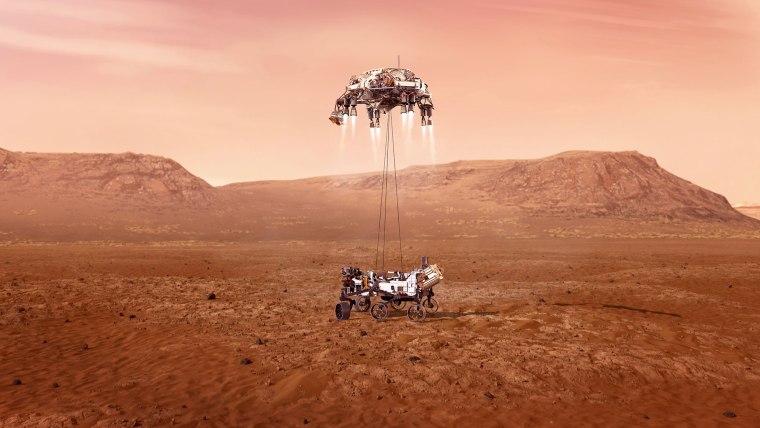
The discovery of long-expired Martian bacteria would permanently change humanity’s view of its own importance.
NASA is reprising an old quest: a search for life on Mars.
The hunt for red planet residents began close to four decades ago, when the agency sent two spacecraft — the Viking landers — to Mars. Their task was to prove that the planet, while red, is not dead.
The landers initially sent back data that seemed consistent with bacteria-like organisms in the soil. But with further analysis, early optimism soured. Was there life on Mars? NASA concluded: Probably not.
This wishy-washy answer was frustratingly ambiguous, especially for a $1 billion experiment. So, NASA is now taking a different approach in its hunt for microbes. Unlike the Viking landers, the new Perseverance rover isn’t looking for chemical signs of metabolism. Instead, assuming it lands successfully on Thursday, Perseverance will trundle around Mars’ gaunt landscapes searching for sediments. These could contain clues to organisms that pitched and swirled in long-vanished seas.
The rationale is simple: If Mars ever had life, the dead will surely outnumber the living, and are therefore more likely to be found. The proposed landing site for Perseverance, Jezero Crater, looks like a former lake basin fed by a dried-out river, a happy hunting ground for a rover prowling for the desiccated remains of early inhabitant.

Seth Shostak, the author of the article you are reading
The samples cached by Perseverance will hopefully be collected and returned to Earth by a future mission, to be analyzed in terrestrial laboratories. There will be no “Eureka” moment for Perseverance; if Martians are found, they will be found on Earth.
But if it that happens, it will be more than an interesting science story. Just as the past is now divided into “before” and “after” the Copernican revolution, so too will discovering long-expired Martian bacteria permanently change humanity’s view of its own importance.
There is, however, one thing that could dampen the impact of finding (dead) life on Mars. If it turns out that Martian organisms were related to Earthly life — if both sport the same DNA biology — then the discovery may point to the way life can accidentally spread between worlds, hitchhiking on dirt clods kicked into space by meteor impacts. That would be interesting, yes. But far more portentous would be to discover that our solar system has had a “second genesis;” that life on Earth and Mars had different origins. That would imply that life is as commonplace in the cosmos.
If so, it would be a near-certainty that in other places among the trillion planets of the Milky Way, life has evolved to a state of self-aware intelligence. Simply getting life started doesn’t guarantee this; there would surely be manifold worlds where life stalls out as pond scum. But that cannot be the case for every planet or moon that spawns biology. Intelligence has survival value.
So, finding Martian life should compel us to abandon the notion that we are privileged, that humans are the sole sentient inhabitants of the universe. Indeed, we would not only have a strong indicator of cosmic company but could infer that it is widespread. It would include beings that are far beyond our own technical level, given that the Sun and its planets are relative newcomers to the universe, billions of years younger than the average solar system. Such a realization would be as consequential to our self-image as when we learned that we are not separate from the fauna of our world, but simply a part of it.
Suddenly, we would confront the likelihood that everything we accomplish has parallels in the actions of unseen others, and that what we find beautiful and worthwhile must have a billion other definitions elsewhere. Scientists, who find joy in being the first to know something, would realize that countless other beings have learned it too. We could be certain that there are vast libraries of knowledge that we cannot enter.
And what of religion? Theology has famously railed against earlier scientific discoveries that seemingly diminished our central position in the cosmos, from Galileo to Darwin. How would it react to learning that not only is our planet not unique, but neither are its most celebrated inhabitants?
A Survata poll from 2013 suggests the response might be more positive than we think. According to the poll’s respondents, up to one-third of the members of major western religions may already believe in extraterrestrial life. Even the Catholic Church, notorious for censuring Galileo, is accepting of at least the possible existence of sentient beings elsewhere in the universe. (Pope Francis has specifically expressed his willingness to baptize Martians.)
Perseverance could put us back on a road long traveled. In the 18th century, telescopes became powerful enough to discern the polar ice caps and surface markings on Mars. The red planet was the only world we knew where conditions might be similar to those on Earth. This likeness launched a durable belief in Martian life, and the Perseverance rover is the latest gambit by science to hunt it down, dead or alive.But what may seem like a straightforward pursuit of a long-standing hypothesis would — if successful — have implications of great philosophical consequence. Protagoras wrote that man is the measure of all things. But thanks to some high-tech hardware lumbering across the dusty sands of a nearby world, that might soon cease to be true
Seth Shostak
No comments:
Post a Comment
Note: Only a member of this blog may post a comment.